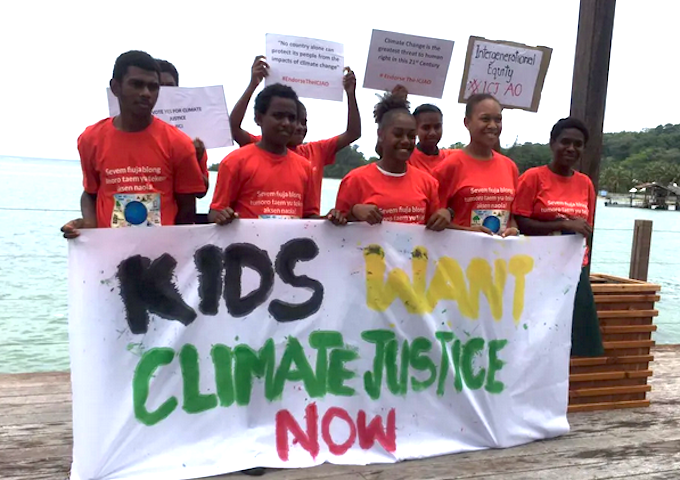
By Jamie Tahana in The Hague for RNZ Pacific
In 2019, a group of law students at the University of the South Pacific, frustrated at the slow pace with which the world’s governments were moving to address the climate crisis, had an idea — they would take the world’s governments to court.
They arranged a meeting with government ministers in Vanuatu and convinced them to take a case to the International Court of Justice (ICJ), the United Nations’ top court, where they would seek an opinion to clarify countries’ legal obligations under international law.
Six years after that idea was hatched in a classroom in Port Vila, the court will today (early Thursday morning NZT) deliver its verdict in the Dutch city of The Hague.

If successful — and those involved are quietly confident they will be — it could have major ramifications for international law, how climate change disputes are litigated, and it could give small Pacific countries greater leverage in arguments around loss and damage.
Most significantly, the claimants argue, it could establish legal consequences for countries that have driven climate change and what they owe to people harmed.
“Six long years of campaigning have led us to this moment,” said Vishal Prasad, the president of Pacific Island Students Fighting Climate Change, the organisation formed out of those original students.
“For too long, international responses have fallen short. We expect a clear and authoritative declaration,” he said.
“[That] climate inaction is not just a failure of policy, but a breach of international law.”
More than 100 countries — including New Zealand, Australia and all the countries of the Pacific — have testified before the court, alongside civil society and intergovernmental organisations.
And now today they will gather in the brick palace that sits in ornate gardens in this canal-ringed city to hear if the judges of the world’s top court agree.
What is the case?
The ICJ adjudicates disputes between nations and issues advisory opinions on big international legal issues.
In this case, Vanuatu asked the UN General Assembly to request the judges to weigh what exactly international law requires states to do about climate change, and what the consequences should be for states that harm the climate through actions or omissions.
Over its deliberations, the court has heard from more than 100 countries and international organisations hoping to influence its opinion, the highest level of participation in the court’s history.
That has included the governments of low-lying islands and atolls in the Pacific, which say they are paying the steepest price for a crisis they had little role in creating.
These nations have long been frustrated with the current mechanisms for addressing climate change, like the UN COP conferences, and are hoping that, ultimately, the court will provide a yardstick by which to measure other countries’ actions.

“I choose my words carefully when I say that this may well be the most consequential case in the history of humanity,” Vanuatu’s Minister for Climate Change Ralph Regenvanu said in his statement to the court last year.
“Let us not allow future generations to look back and wonder why the cause of their doom was condoned.”
But major powers and emitters, like the United States and China, have argued in their testimonies that existing UN agreements, such as the Paris climate accord, are sufficient to address climate change.
“We expect this landmark climate ruling, grounded in binding international law, to reflect the critical legal flashpoints raised during the proceedings,” said Joie Chowdhury, a senior attorney at the US-based Centre for International Environmental Law (which has been involved with the case).
“Among them: whether States’ climate obligations are anchored in multiple legal sources, extending far beyond the Paris Agreement; whether there is a right to remedy for climate harm; and how human rights and the precautionary principle define States’ climate obligations.”

What could this mean?
Rulings from the ICJ are non-binding, and there are myriad cases of international law being flouted by countries the world over.
Still, the court’s opinion — if it falls in Vanuatu’s favour — could still have major ramifications, bolstering the case for linking human rights and climate change in legal proceedings — both international and domestic — and potentially opening the floodgates for climate litigation, where individuals, groups, Indigenous Peoples, and even countries, sue governments or private companies for climate harm.
An advisory opinion would also be a powerful precedent for legislators and judges to call on as they tackle questions related to the climate crisis, and give small countries a powerful cudgel in negotiations over future COP agreements and other climate mechanisms.
“This would empower vulnerable nations and communities to demand accountability, strengthen legal arguments and negotiations and litigation and push for policies that prioritise prevention and redress over delay and denial,” Prasad said.
In essence, those who have taken the case have asked the court to issue an opinion on whether governments have “legal obligations” to protect people from climate hazards, but also whether a failure to meet those obligations could bring “legal consequences”.
At the Peace Palace today, they will find out from the court’s 15 judges.
“[The advisory opinion] is not just a legal milestone, it is a defining moment in the global climate justice movement and a beacon of hope for present and future generations,” said Vanuatu Prime Minister Jotham Napat in a statement ahead of the decision.
“I am hopeful for a powerful opinion from the ICJ. It could set the world on a meaningful path to accountability and action.”
This article is republished under a community partnership agreement with RNZ.











































